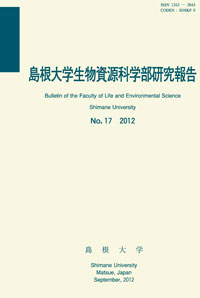島根大学生物資源科学部
ISSN:2435-0885(online)
ISSN:1343-3644(in print)
A publication of this bulletin in print format has not been made since no 24.
ISSN:1343-3644(in print)
A publication of this bulletin in print format has not been made since no 24.

number of downloads : ?
Use this link to cite this item : https://ir.lib.shimane-u.ac.jp/8056
Bulletin of the Faculty of Life and Environmental Science Shimane University 17
2012-09-30 発行
スギ人工林土壌における環境要因の変化とメタン吸収との関係
Relationships between soil environmental factors and methane uptake by soil in a Japanese cedar plantation
File
Description
It is known that the forest soil under an aerobic condition is a biological sink for methane in the atmosphere. Two?thirds of Japanese land are occupied by natural and artificial plantation forest. In a plantation forest, thinning is commonly performed to control tree density dependent upon market demands. Thinning and other forest operation disturb the forest canopy and floor and may alter such environmental factors as soil temperature, soil moisture content, soil gas phase and litter supply. Thinning usually raises the soil temperature and soil moisture, and lowers the soil gas phase and litter supply. In order to clarify the effects of the changes in those factors following forest thinning on the methane uptake rate, we conducted the manipulation experiments in our laboratory. Soil samples taken from a Japanese cedar plantation in the Sambe Forest were incubated at three levels each of temperature, moisture content, soil gas phase and litter materials to determine their effects on methane uptake rate of the soil. As results, the methane uptake rate correlated negatively with soil moisture content and positively with soil gas phase and soil temperature. On the other hand, the mass of litter materials made no significant difference in the rate. When the rate of methane uptake decreased after thinning as reported before, it could be attributable to higher soil moisture and/or lesser soil gas phase. The positive effects of elevated soil temperature on the enhancement of methane uptake by the soils in the thinned forests might be limited.
About This Article
Other Article
PP. 29 - 34
